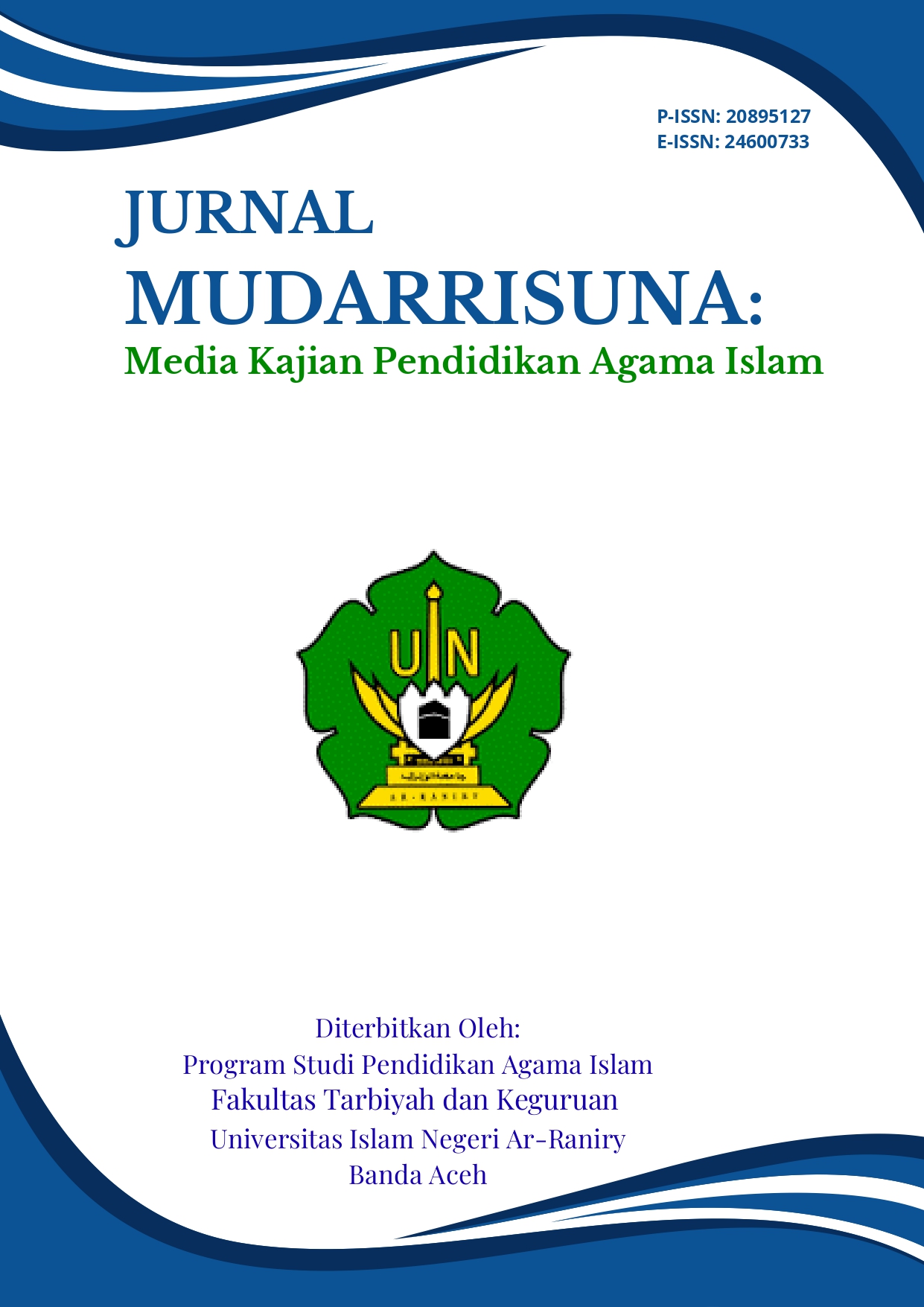URGENSI PENDIDIKAN NILAI-NILAI KARAKTER RABBANI BAGI GENERASI DIGITAL NATIVE
DOI:
https://doi.org/10.22373/jm.v13i3.19293Abstract
The digital native in their daily life coexists a lot and takes advantage of time with digital technology. Therefore, to eliminate various negative impacts, both physically, psychologically, socially, religiously and even in character, requires character education that leads them to become the rabbaniyyun generation who are able to filter themselves in facing the digital world that is pouring over their lives. This library research study found appropriate character education values to be instilled in digital natives, namely rabbani characters. A character that God wants in humans listed in QS. Ali Imran (3): 79, which forms the basis of rabbani character education. The digital native who are rabbaniyyun are keen to learn useful knowledge, teach it to others, and put their knowledge into practiceReferences
Ahman, Mujiyanto, J., Bharati, Dwi Anggani Linggarnggeraini, Y., & Faridi, A. (2019). Literasi digital: Dampak dan tantangan dalam pembelajaran bahasa. Seminar Nasional Pascasarjana UNNES, 386–389. https://proceeding.unnes.ac.id/index.php/snpasca/article/download/313/342/
Baits, A. N. (2019, October). Mendidik Generasi Rabbani. At-Tauhid.
Bayu, D. (n.d.). APJII: Pengguna Internet Indonesia Tembus 210 Juta pada 2022. Dataindonesia.Id. https://dataindonesia.id/digital/detail/apjii-pengguna-internet-indonesia-tembus-210-juta-pada-2022
GLN, T. (2021). Pendidikan, Kementerian Teknologi, D A N Dasar, Direktorat Sekolah Pengantar, Kata. In Modul Literasi Numerasi Di Sekolah Dasar (Vol. 1). http://ditpsd.kemdikbud.go.id/upload/filemanager/2021/06/2 Modul Literasi Numerasi.pdf
Husaini, A. (2012). Pendidikan Islam: Membentuk Manusia Berkarakter dan Beradab (I). Cakrawala Publishing dan Adabi Press.
Juliane, C., Arman, A. A., Sastramihardja, H. S., & Supriana, I. (2017). Digital Teaching Learning for Digital Native ; Tantangan Dan Peluang. Jurnal Ilmiah Rekayasa Dan Manajemen Sistem Informasi, 3(2), 29–35. http://ejournal.uin-suska.ac.id/index.php/RMSI/article/viewFile/4273/2623
Klobility. (2021). 5 Dampak Negatif Era Digital. https://www.klobility.id/post/post/5-dampak-negatif-di-era-digital
Meilinda, N., Malinda, F., & Aisyah, S. M. (2020). Literasi Digital Pada Remaja Digital (Sosialisasi Pemanfaatan Media Sosial Bagi Pelajar Sekolah Menengah Atas). Jurnal Abdimas Mandiri, 4(1), 62–69. https://doi.org/10.36982/jam.v4i1.1047
Mujiburrahman. (2011). Pendidikan Berbasis Syariat Islam di Aceh (1st ed.). Dinas Syariat Islam Aceh.
Munir, A. (2007). Tafsir Tarbawy: Mengungkap Pesan al-Qur’an tentang Pendidikan. STAIN Ponorogo Press.
Mustafa, A. S. F. (2004). Manhaj Pendidikan Anak Muslim (I). Mustaqiim.
Shihab, M. Q. (2006). Tafsir al-Misbah; Pesan, Kesan, dan Keserasian al-Qur’an (2nd ed.). Lentera Hati.
Sujana, I. P. W. M., Sukadi, Cahyadi, I. M. R., & Sari, N. M. W. (2021). Pendidikan karakter untuk generasi digital native. Jurnal Pendidikan Kewarganegaraan Undiksha, 9(2), 518–524. https://ejournal.undiksha.ac.id/index.php/JJPP
Supratman, L. P. (2018). Penggunaan Media Sosial oleh Digital Native. Jurnal ILMU KOMUNIKASI, 15(1), 47–60. https://doi.org/10.24002/jik.v15i1.1243
Suriana. (2019). Strategi Pembinaan Karakter Rabbani dalam Al-Qur’an Melalui Metode Hikmah (I). Bravo Datussalam.
Syarbini, A. (2012). Pendidikan Karakter: Paduan Lengkap Mendidik Karkater Anak di Sekolah, Madrasah, dan Rumah (I).
Downloads
Additional Files
Published
Issue
Section
License
Jurnal MUDARRISUNA: Media Kajian Pendidikan Agama Islam allows the author(s) to hold the copyright and to retain the publishing rights without restrictions. Authors who publish in this journal agree to the following terms:
- Authors retain copyright and grant the journal right of first publication with the work simultaneously licensed under a Creative Commons Attribution-ShareAlike 4.0 International License that allows others to share the work with an acknowledgment of the work's authorship and initial publication in this journal.
- Authors are able to enter into separate, additional contractual arrangements for the non-exclusive distribution of the journal's published version of the work (e.g., post it to an institutional repository or publish it in a book), with an acknowledgment of its initial publication in this journal.
- Authors are permitted and encouraged to post their work online (e.g., in institutional repositories or on their website) prior to and during the submission process, as it can lead to productive exchanges, as well as earlier and greater citation of published work.




